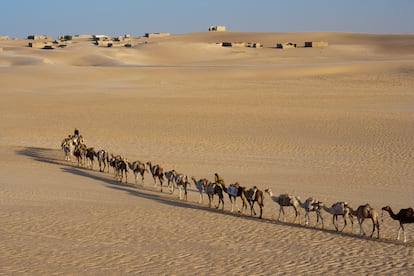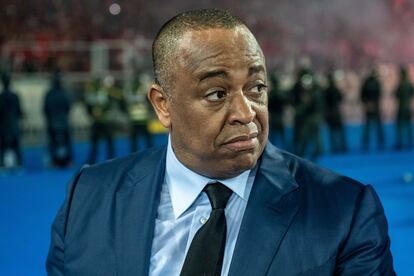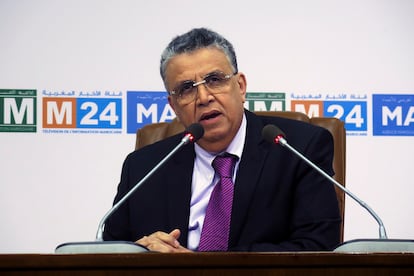The Pablo Escobar of the Sahara reveals corruption within Morocco’s ruling class
Accusations launched from prison by a Malian drug lord have led to the arrest of senior officials linked to soccer, politics and construction

In an official survey, 72% of Moroccan citizens recognize that there’s corruption in the country. However, despite recognition of the problem, it’s less common for cases of fraud among the ruling class to be aired in the press, in full view of public opinion.
Recently, from a Casablanca prison, a Malian drug lord named Ahmed Ben Brahim — nicknamed the “Pablo Escobar of the Sahara” — testified before the police. He has accused former Moroccan accomplices and frontmen of having seized his assets. This information has led to the arrests of 25 suspects, in one of the largest anti-corruption operations to have ever taken place in the North African country.
Local media outlets report that, among those arrested, there are two senior officials from the Authenticity and Modernity Party, which is integrated into the current coalition government. Others who have been detained are linked to the construction industry, public works and soccer. Jurists and members of Morocco’s security apparatus have also been taken into custody. Sentences of up to 20 years in prison await each one of them, if convicted.
The Pablo Escobar of the Sahara was arrested in 2019 at the Casablanca Mohammed V International Airport, after having arrived from Mauritania, where he had been imprisoned for four years due to an Interpol arrest warrant for drug-trafficking. A Moroccan court subsequently sentenced him to 10 years in prison for being responsible for a multinational drug-trafficking plot, according to the Paris-based pan-African weekly Jeune Afrique. Ben Brahim was indicted for directing a network dedicated to distributing Moroccan hashish in West Africa and transporting cocaine shipments — originating in Latin America — to North African ports, with a final destination in Europe.
The drug lord’s fortune was valued at tens of millions of dollars, with properties in Brazil, Bolivia and Russia, as well as on the Spanish Costa del Sol. His real estate assets extended from resort towns along the Mediterranean coast to Casablanca. In Morocco’s economic capital, he kept a sumptuous villa with large gardens, as well as a luxury apartment. Following his arrest, both properties were quickly occupied by two of his alleged associates. The first was taken by Said Naciri — president of Wydad AC, a major professional soccer team in Casablanca — and the second was taken by Abdeni Biioui, president of the Eastern Regional Council of Morocco (whose capital is Oujda), who also owns a construction company that receives public contracts. They have been behind bars since the end of December. Both are prominent members of the Authenticity and Modernity Party.
In prison — before agents from the Central Department of Judicial Investigations (the Moroccan FBI) — Ben Brahim declared that his former associates had backstabbed him, after buying several trucks from him. When the police intercepted those vehicles — loaded with 40 tons of cannabis resin — the documentation was still in Ben Brahim’s name, instead of having been transferred to a new owner.
Born in 1976 in the city of Kidal — capital of the desert region of northern Mali — Ben Brahim was destined for life as a shepherd. That is, until a chance encounter with a French driver — whom he helped when his car had crashed in the middle of the Dakar Rally — changed his life. With the help of the grateful Frenchman, young Ben Ibrahim soon dedicated himself to importing used vehicles from Europe and trading in gold. His business later focused on drugs.
During his constant travels through the region — meeting new tribes and learning new dialects — the Malian citizen became an expert navigator through the sands of the Sahel and the Sahara, a choice space for armed groups, jihadist militias and mafias engaged in all types of trafficking. Powerful men like Seif al Islam Gaddafi — son of the Libyan dictator, who was deposed in 2011 — entrusted Ben Brahim with the most delicate transport missions. His mother — who was born in Oujda — also opened the doors of North Africa to him.

In this Moroccan city on the border with Algeria, he came into contact with Biioui, who — according to the Moroccan press — had served time for robbery in France and for drug-trafficking in Spain, before building a construction empire and becoming a legislator, who sits on the Moroccan Parliament’s Infrastructure Commission. The two men teamed up to transport hashish from northern Morocco to West Africa. In his trips to the Sahara Desert through the Moroccan city of Zagora, he met Said Naciri, a soccer magnate and regional political chief. He would eventually sell Ben Brahim’s properties in the Sahara, transferring large sums to his own accounts.
In Morocco, the population almost seems to have lost their fear of speaking openly about corruption. About three-quarters of citizens recognize that fraudulent practices are widespread, according to the survey presented this past December by the National Authority for Probity, Prevention and the Fight against Corruption, an official body. In recent years, Morocco has fallen 21 positions on Transparency International’s Corruption Perceptions Index, now ranking 94th out of 180 states examined.
In a new scandal revealed earlier this month by the Moroccan press, Aziz El Badraoui — who presided over Raja CA, the other big soccer club in Casablanca, from 2022 until 2023 — has been arrested, accused of charging commissions for the awarding of public contracts. The world of soccer is being questioned in Morocco, as it prepares to organize the Africa Cup of Nations and the 2030 World Cup, together with Spain and Portugal.
Along with El Badraoui, Mohamed Karimin — a former federal legislator and former mayor of Bouznika for the Istiqlal Party, which is also part of Prime Minister Aziz Ajanuch’s ruling coalition — has also been placed in preventive detention. He is considered to be one of the most influential politicians in Rabat.
The Moroccan affiliate of Transparency International sees it as “very worrying” that 29 members of Parliament have been prosecuted for corruption over the last five years. According to the digital information portal Le 360, at least 20 of the 395 members of the House of Representatives are being investigated by the judicial authorities. Among them, half-a-dozen are already in jail.
In a twist that has given more media attention to the case, the famous Moroccan singer Latifa Raafat admitted before a judge that she had been married for “four months and 10 days” to the Malian drug lord. However, she denied having any knowledge of the illegal activities that her ex-husband was engaged in. A domestic worker who was employed by the couple returned to Morocco from Spain (where she currently works) to support Raafat’s testimony.

The Moroccan weekly TelQuel has described the case of the Pablo Escobar of the Sahara as one of the biggest scandals recorded in the history of the kingdom, in which “drug-trafficking, politics and business” intermingle.
Moroccan YouTuber Mohamed Reda Taoujini — who has nearly 500,000 subscribers on his channel — was sentenced to two years in prison on Thursday, February 22, by a court in Agadir. The young influencer was accused of having defamed Minister of Justice Abdellatif Ouahbi, a top leader of the Authenticity and Modernity Party. Taoujini demanded his resignation in a video posted on social media, blaming the minister for having brought people accused of drug-trafficking into politics.
Sign up for our weekly newsletter to get more English-language news coverage from EL PAÍS USA Edition
Tu suscripción se está usando en otro dispositivo
¿Quieres añadir otro usuario a tu suscripción?
Si continúas leyendo en este dispositivo, no se podrá leer en el otro.
FlechaTu suscripción se está usando en otro dispositivo y solo puedes acceder a EL PAÍS desde un dispositivo a la vez.
Si quieres compartir tu cuenta, cambia tu suscripción a la modalidad Premium, así podrás añadir otro usuario. Cada uno accederá con su propia cuenta de email, lo que os permitirá personalizar vuestra experiencia en EL PAÍS.
¿Tienes una suscripción de empresa? Accede aquí para contratar más cuentas.
En el caso de no saber quién está usando tu cuenta, te recomendamos cambiar tu contraseña aquí.
Si decides continuar compartiendo tu cuenta, este mensaje se mostrará en tu dispositivo y en el de la otra persona que está usando tu cuenta de forma indefinida, afectando a tu experiencia de lectura. Puedes consultar aquí los términos y condiciones de la suscripción digital.









































